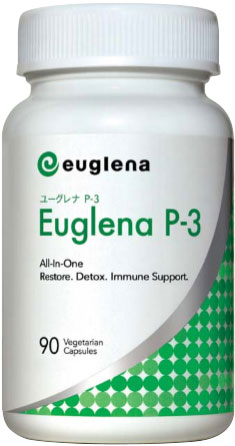 A new superfood
Who would have thought that something deemed to be at the bottom of the food chain could now be considered a superfood? Euglena is a microscopic algae that contains 59 essential nutrients needed by our body to achieve optimal health. Cultivated in Okinawa, this rare organism combines both plant and animal cell characteristics to efficiently absorb nutrients.
Euglena has a unique, naturally occurring compound called Paramylon, which helps remove undesirable substances such as fat and cholesterol. It is also a non-digestible dietary fibre with a sponge-like structure for detox and immune support.
On the beauty side, Euglena contains properties that increase the production of dermal fibroblasts, which provide additional defences against ultraviolet light and help keep skin looking youthful. It also triggers the formation of collagen, an element that fights ageing. Euglena is also used in hair and scalp care products to restore damaged hair and provide moisture and bounce to create luscious and healthy looking hair.
Euglena is used as an ingredient in beverages, cosmetics, hair care products and supplements. It can be purchased at:
A new superfood
Who would have thought that something deemed to be at the bottom of the food chain could now be considered a superfood? Euglena is a microscopic algae that contains 59 essential nutrients needed by our body to achieve optimal health. Cultivated in Okinawa, this rare organism combines both plant and animal cell characteristics to efficiently absorb nutrients.
Euglena has a unique, naturally occurring compound called Paramylon, which helps remove undesirable substances such as fat and cholesterol. It is also a non-digestible dietary fibre with a sponge-like structure for detox and immune support.
On the beauty side, Euglena contains properties that increase the production of dermal fibroblasts, which provide additional defences against ultraviolet light and help keep skin looking youthful. It also triggers the formation of collagen, an element that fights ageing. Euglena is also used in hair and scalp care products to restore damaged hair and provide moisture and bounce to create luscious and healthy looking hair.
Euglena is used as an ingredient in beverages, cosmetics, hair care products and supplements. It can be purchased at:
- Aesthetic & Medical Clinic
- Dr JS Medical Clinic
- The Nutrition Practice
- Life Giving Sciences
- Nishino Pharmacy (Isetan Scotts, Isetan Westgate, Takashimaya and Liang Court)
- Specialist Compounding Pharmacy
- Welcia-BHG Pharmacy (Bugis Junction)









